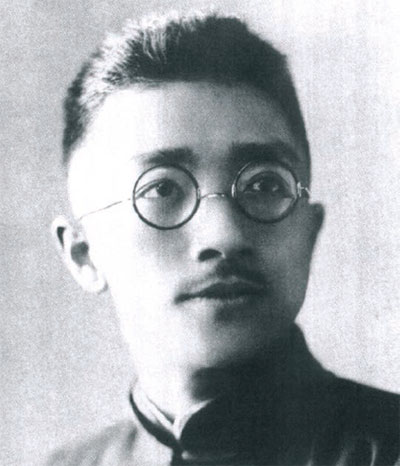
Man of the year: The University Library is celebrating the centennial graduation year of Hu Shih 1914, who left his mark both on Cornell and the Chinese language. Photo: Collected Writings of Hu Shih, Volume 3
Hu Shih 1914 has long been considered, in the words of University Archivist Elaine Engst, MA ’72, “the most famous Cornell alumnus Americans have never heard of.” In honor of the centennial of his graduation, the University has been raising his profile with a series of salon-style talks about this prolific Chinese-born writer, scholar, poet, translator, statesman, and philosopher.
Hu is a venerated figure among the educated classes in China and Taiwan. In the salons, so far given in Seattle and San Francisco (with the next set for New York City’s Carriage House Center in October), historian Sherman Cochran makes the case that he is indeed one of the greatest Cornell alumni. He compares him to the likes of Supreme Court Justice Ruth Bader Ginsburg ’54, writer Thomas Pynchon ’59 — even actor and football star Ed Marinaro ’72. “The great man theory of history is a little outdated,” observes Cochran, the Hu Shih professor of Chinese history emeritus. “But as a public figure in official life, he was on par with Ginsburg; as a writer in both the popular press and as an esoteric scholar, he holds his own against Pynchon.” But . . . Ed Marinaro? “Hu Shih was a celebrity in his time,” Sherman says. “He was constantly referred to in the press and in scholarly circles and was extremely popular, and that’s without the benefit of television or radio.”
Hu came to Cornell on a Boxer Indemnity Scholarship, a program (funded by compensation money paid after the rebellion) that introduced many young Chinese scholars to Western ideas, creating an elite group that would effect sweeping changes in their homeland. After earning a PhD in philosophy from Columbia, he returned to China and became determined to modernize its language and literature. While at Peking University, he oversaw the translation of classical Chinese works into common speech, a radical undertaking that eventually led to the government’s adoption of the vernacular as the national language. “He wanted ordinary people to be able to read and understand these materials,” says Cochran. “But he also wanted people to write like they spoke.” It was a massive project, but merely one aspect of Hu’s impact on domestic and international affairs. As ambassador to the United States (1938–42) and later representative to the United Nations, Hu oversaw major changes in foreign policy. But his nationalist ideals ran counter to Mao’s communist principles, and he fell out of favor; after the 1949 revolution, he moved to New York City and then to Taipei. He helmed Taiwan’s leading scholarly organization, the Academia Sinica, until his death in 1962 at age seventy.
Three years ago, the University marked the centennial of Hu’s landmark effort to enrich Chinese scholarship on campus. In 1911, he arranged for 300 books to be shipped to Ithaca—materials that laid the groundwork for Cornell’s expansive Asia collection. “It is our great pleasure to see the library of this university become one of the greatest college libraries in America,” he wrote at the time, “and it is also our duty to do our best to help the library grow.” Seven years later, the donation was incorporated into the Wason Collection on East Asia, which has since grown to 1.3 million volumes. “There is still something magical about print newspapers and books in native languages,” says associate university librarian Xin Li, who leads the salons with Cochran, “and the library is a home away from home for many Chinese students and scholars.” While most campus tourists gravitate to the clock tower and the suspension bridge, Engst notes that almost every Chinese visitor has another must-see: the Hu Shih collection.


